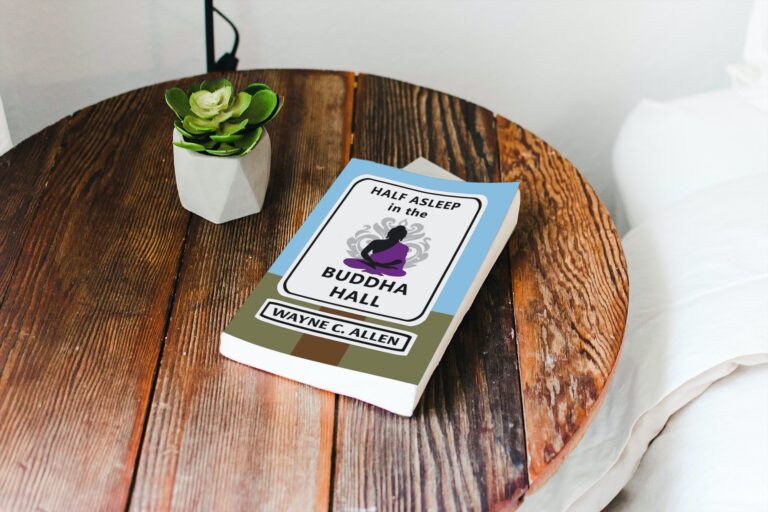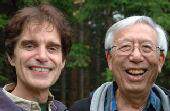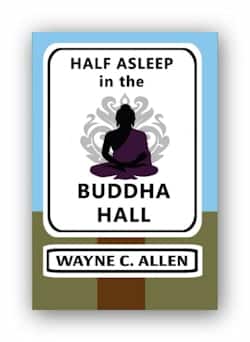Half Asleep in the Buddha Hall is a light-hearted guide to living life fully and deeply. Using Zen stories old and new, illustrations and exercises, Wayne C. Allen takes you on a walk through the workings of your mind, heart, and soul.
Author: (Wayne C. Allen)

For those who love Eastern thought, and equally for those who are fearless explorers of their internal space, Half Asleep in the Buddha Hall is an eye-opening jaunt through the ages-while always bringing you into direct contact with yourself-in this moment.
Half Asleep in the Buddha Hall is designed to help you to see the wisdom that is contained in simplicity, in “not knowing,” and in fully living your life. Forever, Zen has pointed the essence of life—to clarity, presence, and having a sense of humour.

This book is a veritable smorgasbord of exercises, tips and tales.
Like its author, this book is novel, lighthearted, earnest, quirky, and very helpful.
~ Bennet Wong & Jock McKeen
~Co-founders, The Haven Institute

Just wanted to let you know that I just finished reading Half Asleep in the Buddha Hall. More than a book it has been an experience. I have always admired the way that you can put profound insights across so simply — and effortlessly. Thank you so much for all that is there in the book. Of course, this was just a first reading and at so many stages the book made me reflect, pause, wonder, and of course, those ‘aha’ moments. It also gave rise to many questions. And I think your book is one of those that will make the reader grow with every reading, like a ripple that takes you in deeper with every interaction with it.
~ Sharmila Bhosale
Select one or more:
–> Read More Reviews
–> Read a Sample
–> More about the Book
You Are What You Cling To
A Zen temple had a tradition. The Abbot, upon realizing he was dying, would put pen to paper and write a death poem, which the remaining monks found comforting.
The current Abbot became aware of his impending death.
He took to his bed, yet wrote no poem.
The monks became more and more agitated, asking, and then demanding that he keep with tradition.
Finally, with a weary smile, the Abbot wrote, and died.
After the funeral, the monks assembled to hear the poem, which went:
Life is thus, and death is thus.
Poem or no poem, what’s the fuss?
+++++++++++++++++++++++++++++
A new minister was in the choir’s preparation room. The Opening Music played. The choir entered the sanctuary. Following in a row, each walked two normal steps, then took a giant step, then resumed taking normal steps to the choir loft.
Later, the minister asked why they entered the way they did. He heard, “That’s the way we always did it.”
The minister, curious, asked the oldest member.She laughed. “60 years ago, the church was drafty and cold. They decided to put in a furnace. They cut open the floor to run the ducts, and ran out of money for two years. The choir members had to step over the gap in the floor for the whole time.
To this day, they just can’t stop themselves.”
This book contains a mass of contradictions, which is difficult for the Western mind to accept. We naturally look for the ‘right,’ ‘correct,’ ‘true’ versions of pretty much everything. Much of what we accept as true or right is simply the endless repetition of an unreflected-upon process of learned judgements.
What do you cling to, and why?
While it might be said that “We are the sum of our experiences,” it is also ‘so’ that we are nothing more than our current experience. This can be a difficult concept to grasp.
At many workshops, people will check in with their stories, professions, experiences, and expectations. I recently participated in a small group. A guy checked in. When he finished, another participant attempted to check in by describing her memory of an experience she had earlier in the day —the experience being about the man who had just checked in.
The leader stopped her, and asked her to limit herself to talking about what was up for her right now—no story telling. The participant got quite indignant. She said, “No one ever listens to me! You disempowered me by stopping me, keeping me in check. People have been doing that all of my life. I want to make a contribution out of my experience and am thwarted. I am angry with you.” The leader encouraged her to continue.
She did, mostly in the same vein, repeating how she hated it that no one ever listened to and heard her. She talked angrily for some time, and then the leaders did some Breathwork with her.
As I watched and listened, I thought, “Her experience of not being heard in the past, (or perhaps her experience of not being heard the way she wanted to be) is causing her to miss that she is being listened to intently in this moment. Rather than her reporting a past event, we are seeing and hearing her as she is, right now.”
Living in the moment is blocked by clinging to the past.
The habit of clinging is so ingrained that we don’t notice we are doing it. People have a profound, life changing experience and perhaps notice a relaxation in their bodies. Then, they remember their past stories, their eyes glaze over, and they begin to re-describe themselves in terms of their past experience. They discount the present on the altar of the past.
They return to being what they cling to.
Bob says, “Mary does (this,) and I do (that.)” The intent is to convey an “a leads to b” relationship between the two events. This is odd.
First, thinking this way means that Bob sees himself as a helpless victim of Mary’s actions. This lets him off the hook, both for his behaviours and for his feelings.
Second, Bob acts as if this supposed causality is innately part of the system—as if there are no other choices available.
And the irony is that as long as Bob thinks this way, he’s right.
On the other hand, since it appears that Mary is not holding a gun to Bob’s head, Bob could do anything he wanted when Mary acts. Bob is not a helpless victim, without choice. Bob renders himself helpless by clinging to the story he tells himself, (the ‘a’ leads to ‘b’ story) as opposed to acting clearly, with no clinging.
In order for us to move past the things we cling to, we must let go.
That this is obvious does not mean that letting go is easy. I’m writing this in the Vancouver Airport. Most Canadian airports I fly out of have a booth, flogging ‘Airmiles MasterCards.’ I had the regular version of this card, so I’d walk past and ignore the entreaties of the nice people flogging the cards. You could say I was clinging to the idea that I knew what they would say and had predetermined that I wasn’t interested.
Just a little data for you: My flight, round trip from Toronto to Vancouver, cost me 2800 points. I only had 2600, so I had to top up, at a cost of $110 dollars.
Today, I stopped to listen to the pitch about the GOLD Airmiles Card. I did so because I judged the woman doing the pitch was very cute, (so I thought I’d enjoy talking with her,) and because, for the first time (regarding Airmiles MasterCards,) I was curious as opposed to clinging.
Turns out, for $70 bucks, I collect Airmiles 4 times faster, and can fly on WestJet for 1600 points, anytime, anywhere they fly. Hmm. Want to guess what I did?
As soon as I forget that things are as they are in this moment, and then they shift, (shorthand: things are as they are, and then they aren’t) I create for myself the experience of being stuck and helpless. If I have predetermined (in advance and with no evidence) that there is only one possibility or one choice of behaviour, then there is only one possible way the present situation can unfold.
Notice that I said, “in advance and with no evidence.”
To ‘wake up,’ I must remember that past experience has no legislative ability. Just because I’ve refused to listen to Airmiles pitches for years and years, I don’t ‘have to’ this time.
Just because, in the past, you have chosen to think you were being invalidated, does not mean that you actually were. More significantly, it does not mean that you will be invalidated this time. However, if you expect to be invalidated, you will create that experience, no matter what is really going on.
In the past, I have made it difficult for myself to hear and accept warm compliments. Darbella laughs at me about this often (among other things she laughs at me about.) She says, “They all love you. They all hate you. They all love you. They all hate you. Or, you could get over yourself.”
I wanted to change my pattern, so I began a project of listening for compliments. I discovered that I was receiving what I was listening for. I can now say that I hear and accept warm compliments.
I do not minimize, write off, or limit the experience. I do not say, “Well, this won’t last. Soon, I will go back to blowing off compliments.” I say, “I heard and felt this experience completely, and I like this feeling.” I thus am opening myself to continuing to hear what is actually offered.
We are what we cling to.
Old habits die hard. This is why we experience what we expect to experience, despite what is really happening. The only way past this is to notice how clinging to “This is the way I’ve always done it,” gets us the same results.
If I do not like what I am getting, there is only one choice. I must let go of clinging to the old way, and shift what I do. Things shift when I do.

We tend to view life according to the beliefs of our tribe. That is, our way of looking at the world is largely influenced by our upbringing and culture. We view the world from within our small circle and think we know the world, but step outside of the circle and we can see from a very different perspective. Not only does the rest of the world look different, but from this new vantage point we also gain new perspectives into our own life.
In Half Asleep in the Buddha Hall, through traditional and new Zen stories, Wayne C. Allen opens up concepts largely unfamiliar to most Western trained minds. This book, both profound and yet easy to understand, will gently open your mind to a greater perspective, an expanded awareness if you will, that will bring you to a deeper understanding of yourself and the world around you.
As an avid proponent of life-long learning and self-development, I offer my highest recommendation for Half Asleep in the Buddha Hall to all who are interested in their personal evolution. A greater perspective awaits you!
~ Dennis “Boogie Jack” Gaskill

Wayne Allen entices us to look at how we examine who and what we are as we go through our day to day lives. But more than that, he compels us to go well beyond examining ourselves, and actively DO the things that will bring us contentedness.
Replete with anecdotes, stories, examples and, profound introductory pieces, this book engages us to look deep within ourselves, while remaining simple. Gentle humor and genuine honesty are used to keep the reader thinking, feeling, doing and being. Read it.…live it.
~ Debashis Dutta, Coordinator,
Human Services Foundation,
Conestoga College, Kitchener, Ontario

We all spend a lifetime attempting to do only one thing: LOVE OURSELVES!
Wayne has the courage to share with us his own journey to AWAKEN TO LOVE in Half Asleep in the Buddha Hall, and in so doing he has guided us to LOVE OURSELVES even more, right here and NOW.
There can be no greater gift.
~ Dr. Scout Cloud Lee

This book, like his book, This Endless Moment, and his blog, is interested in moving you off the wheel of thinking, feeling, and doing the same thing, endlessly, with the same dysfunctional results.
The book is thoughtful, funny, and filled with concrete examples of how we create our own unhappiness.
It comes at life from a Zen perspective and invites you to take responsibility for you own life. I have found it invaluable in pushing me off stuck and into elegant actions that are a stark contrast to my pouting, “Why does she make me feel this way” actions that get me more of what I don’t want—isolation and anger.
After working with the concepts in this book I found I could move toward connection, which is what I really want.
It really is so much better to hug my beautiful wife than it is to walk out the door in a snit. Much better.
~ William Bradbury
HALF ASLEEP IN THE BUDDHA HALL provides the Zen principles you need
to discover how to live life with depth, compassion, and assurance.
Half Asleep in the Buddha Hall is designed to help you to see the wisdom that is contained in simplicity, in “not knowing,” and in fully living your life. Forever, Zen has pointed the essence of life—to clarity, presence, and having a sense of humour.
As you read, you will discover: - ways to step back and see the operation of your distinction-making mind. You’ll learn to treat your mind with gentleness and stop letting it run your life.
- 3 keys to stop being lost in your head — how to live in the here and now, as you easily let go of the dramas and stories of the past.
- the difference between a desire and reality — how to wake up, grow up, and get over yourself.
- the importance of realizing you have no self. You’ll find the strength that comes from being focused on your present-moment actions.
- why your history is just that — a story. You will see clearly that, far from being “true” your history is made up of events you’ve strung together like beads. You’ll see that there are many more events that also happened, and that you’ve chosen to ignore.
- the lesson of the laundromat. Each event, even the small ones, is worthy of our attention.
- the dangers of thought loops. You’ll discover the patterns you’ve created, and how to escape them.
- what real baggage tells us about emotional baggage. It’s always the question—do I travel light, or bring the kitchen sink with me? With lightness comes flexibility!
- how AirMiles can lead to waking up. It’s not what we believe is going on—it’s what’s actually going on!
- when beliefs are obstacles. Any time we are more invested in our beliefs than in what is right in front of us, we are lost.
- that a load of intelligence is a dangerous thing.
- how one word sets you free from fear (hint.. it begins with a “p”.)
- why intentions and dreams rarely satisfy.
- the 4 Truths that transform your life.
- why Yogi Berra is a Zen master.
- 5 ways to live in the present, persistently.
- 6 Methods to make better choices.
- 3 methods to break the egotism habit through self-responsibility.
- the best way to escape from Indra’s net.
- 10 exercises in Zen being.
- 10 ways to relate with depth and compassion.
As I Write in My Book.…
I want to encourage you to step back from Western culture and belief systems, for no particular reason other than to give you a chance to air out your mind. This is meant to be like walking around a statue. The front and the back may seem different, but it is the same statue, seen from a different perspective.
Ultimately, my wish is that you expand your repertoire regarding how you choose to view, understand, and live your life. This book will suggest a moment-by-moment path to deeper, committed, and purposeful living.
You will learn the practicalities of living a full and rich life:
Another way of putting “All that we are is the result of what we have thought” is “You are what you cling to.” We cling to stuff—beliefs, people, objects—for fear of what will happen, or who we will be, if we let them go.
Yet, all that our desperate clinging gets us is disillusionment and desperation. Non-clinging happens as we disentangle the mind from its obsession with our thoughts and beliefs. To drop clinging, we need to differentiate between moment-by-moment situations, and our judgements and stories about them.
The (moment of awakening) like all of life, happened in the ‘Now.’ In a sense, our enlightenment comes when we realize that the only way to enjoy life is to enjoy the endless ‘Now.’ Just as there is no fixed ‘goal,’ there is no thing called enlightenment—no fixed state you arrive at. There is just one moment after another of enlightened acting. Or, put another way, I have no life, no fixed thing called ‘my life.’ I have a string of ‘Now,’ which is a moment-by-moment unfolding. I can simplify the process of coming into the Now by simply interacting with the moment.
I do this by choosing to step out of my head, my imagination, my pretending that I have a life, a past, a future. I step into this moment, and realize that all there is, is this moment. I then choose how I relate to it.
Commit to walking a path that leads nowhere, walked by no one. One step and one step, this path is always walked in the now-here, (because there can be no destination, only the walk, until, paradoxically, you reach the end for all of us—death.)
This wisdom path is lived with attention to every detail, every interpretation—yet with the recognition that ‘no one’ is walking, ‘no one’ is interpreting. Thinking that there is a ‘you’ in all of this is your ‘stuck tail’—your ego identifying with the role of interpreter, walker.
I know. What the heck is he talking about?
My intent is to suggest letting go of your present way of seeing and being, so that you might self-less-ly walk the ‘wisdom path.’ Yet, nothing changes in the ‘real’ world. You still have to make a living and have a life.
So what does change? Your focus, attitude, and your commitment. Instead of mindlessness, or griping, or complaining, you do what you do— you attend to right now—here, and here alone. You chop wood, carry water, with total, mindful attention.
And then, as your ego pops up, smile and think, ‘caught tail.’ Let go, give yourself a shake, and go back to playing—being.
Or, you can choose to keep pretending that anyone cares, and that rescue is at hand. 95% of the population buys into that delusion. Drop me a line if this delusion works out for you, eh?
I suspect that ‘no-one’ will reply…
In Zen, we speak of discipline. The key discipline is ‘non-following,’ or non-attachment. You let each non-helpful thought go by not clinging to it. Now, of course, as with Beth, such thoughts will arise until you die.
Following such thoughts leads to paralysis by analysis. This paralysis seems inevitable, until I notice that repeating dysfunctional thought patterns causes the paralysis. I am ‘lost in thought,’ and the cure is to stop myself—not by more thinking, but by acting. Less thought, more action. Remember: you cause yourself problems by over-thinking and under-doing. Pick a way to be, and then just be it. Swing for the fences, letting the critical thoughts fade into background noise.
And here is the point!
By now, I trust that you ‘get’ what this book is about—that you create your reality, and populate your reality by telling yourself stories. The stories are about you, others, and the world. You understand that your stories are just stories—are about as ‘real’ as nursery rhymes—and realize that you are on the pathless path.
Half Asleep in the Buddha Hall

Available formats:
** Paperback book, 204 pages
** E‑book digital downloads
** PDF download
* Publisher: The Phoenix Centre Press (June 2009)
* Language: English
*ISBN: 978–0‑9684446–6‑5
Purchase Options
Paperback: $20.00, Kindle, digital editions $2.99, PDF file $4.00
Paperbacks
Purchase paperback from Amazon.com
E‑Books
Purchase Kindle version from Amazon.com
Purchase digital versions (Apple, Nook, Kobo, etc.) from this page
Purchase PDF version from our site
